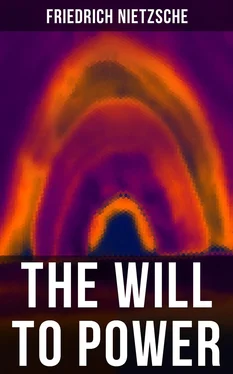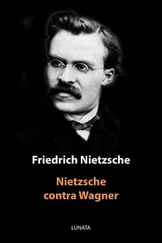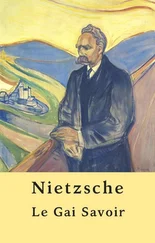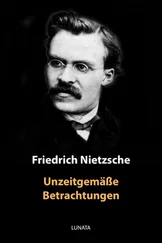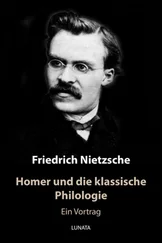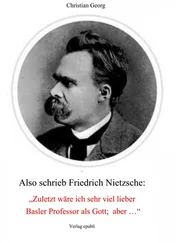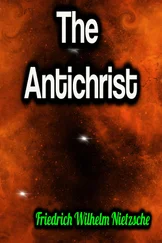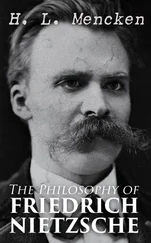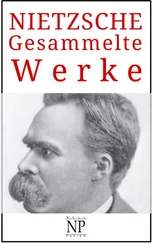Why disturb this pure foolery? Why darken it with our cares concerning man, people, goals, the future? Even if we wished to do so, we shouldn't succeed. In all things these people see the reflection of their own venerable stupidity and goodness (in them the old God— deus myops— still lives); we others see something else in everything: our problematic nature, our contradictions, our deeper, more painful, and more suspicious wisdom.
321.
He who finds a particular virtue an easy matter, ultimately laughs at it. Seriousness cannot be maintained once virtue is attained. As soon as a man has reached virtue, he jumps out of it—whither? Into devilry.
Meanwhile, how intelligent all our evil tendencies and impulses have become! What an amount of inquisitiveness torments them! They are all fishhooks of knowledge!
322.
The idea is to associate vice with something so terrible that at last one is obliged to run away from it in order to be rid of its associations. This is the well-known case of Tannhäuser. Tannhäuser, brought to his wits' end by Wagnerian music, cannot endure life any longer even in the company of Mrs. Venus: suddenly virtue begins to have a charm for him; a Thuringian virgin goes up in price, and what is even worse still, he shows a liking for Wolfram von Eschenbach's melody....
323.
The Patrons of Virtue. —Lust of property, lust of power, laziness, simplicity, fear; all these things are interested in virtue; that is why it stands so securely.
324.
Virtue is no longer believed in; its powers of attraction are dead; what is needed is some one who will once more bring it into the market in the form of an outlandish kind of adventure and of dissipation. It exacts too much extravagance and narrow-mindedness from its believers to allow of conscience not being against it to-day. Certainly, for people, without either consciences or scruples, this may constitute its new charm: it is now what it has never been before—a vice.
325.
Virtue is still the most expensive vice: let it remain so!
326.
Virtues are as dangerous as vices, in so far as they are allowed to rule over one as authorities and laws coming from outside, and not as qualities one develops one's self. The latter is the only right way; they should be the most personal means of defence and most individual needs—the determining factors of precisely our existence and growth, which we recognise and acknowledge independently of the question whether others grow with us with the help of the same or of different principles. This view of the danger of the virtue which is understood as impersonal and objective also holds good of modesty: through modesty many of the choicest intellects perish. The morality of modesty is the worst possible softening influence for those souls for which it is pre-eminently necessary that they become hard betimes.
327.
The domain of morality must be reduced and limited step by step; the names of the instincts which are really active in this sphere must be drawn into the light of day and honoured, after have lain all this time in the concealment of hypocritical names of virtue. Out of respect for one's "honesty," which makes itself heard ever more and more imperiously, one ought to unlearn the shame which makes one deny and "explain away" all natural instincts. The extent to which one can dispense with virtue is the measure of one's strength; and a height may be imagined where the notion "virtue" is understood in such a way as to be reminiscent of virtù —the virtue of the Renaissance—free from moralic acid. But for the moment—how remote this ideal seems!
The reduction of the domain of morality is a sign of its progress. Wherever, hitherto, thought has not been guided by causality, thinking has taken a moral turn.
328.
After all, what have I achieved? Let us not close our eyes to this wonderful result: I have lent new charms to virtue—it now affects one in the same way as something forbidden. It has our most subtle honesty against it, it is salted in the " cum grano salis " of the scientific pang of conscience. It savours of antiquity and of old fashion, and thus it is at last beginning to draw refined people and to make them inquisitive—in short, it affects us like a vice. Only after we have once recognised that everything consists of lies and appearance, shall we have again earned the right to uphold this most beautiful of all fictions—virtue. There will then remain no further reason to deprive ourselves of it: only when we have shown virtue to be a form of immorality do we again justify it, —it then becomes classified, and likened, in its fundamental features, to the profound and general immorality of all existence, of which it is then shown to be a part. It appears as a form of luxury of the first order, the most arrogant, the dearest, and rarest form of vice. We have robbed it of its grimaces and divested it of its drapery; we have delivered it from the importunate familiarity of the crowd; we have deprived it of its ridiculous rigidity, its empty expression, its stiff false hair, and its hieratic muscles.
329.
And is it supposed that I have thereby done any harm to virtue?... Just as little as anarchists do to princes. Only since they have been shot at, have they once more sat securely on their thrones.... For thus it has always been and will ever be: one cannot do a thing a better service than to persecute it and to run it to earth.... This—I have done.
5. The Moral Ideal
A. A Criticism of Ideals
Table of Contents
330.
It were the thing to begin this criticism in suchwise as to do away with the word " Ideal ": a criticism of desiderata.
331.
Only the fewest amongst us are aware of what is involved, from the standpoint of desirability, in every "thus should it be, but it is not," or even "thus it ought to have been": such expressions of opinion involve a condemnation of the whole course of events. For there is nothing quite isolated in the world: the smallest thing bears the largest on its back; on thy small injustice the whole nature of the future depends; the whole is condemned by every criticism which is directed at the smallest part of it. Now granting that the moral norm—even as Kant understood it—is never completely fulfilled, and remains like a sort of Beyond hanging over reality without ever falling down to it; then morality would contain in itself a judgment concerning the whole, which would still, however, allow of the question: whence does it get the right thereto? How does the part come to acquire this judicial position relative to the whole? And if, as some have declared, this moral condemnation of, and dissatisfaction with, reality, is an ineradicable instinct, is it not possible that this instinct may perhaps belong to the ineradicable stupidities and immodesties of our species?—But in saying this, we are doing precisely what we deprecate; the point of view of desirability and of unauthorised fault-finding is part and parcel of the whole character of worldly phenomena just as every injustice and imperfection is—it is our very notion of "perfection" which is never gratified. Every instinct which desires to be indulged gives expression to its dissatisfaction with the present state of things: how? Is the whole perhaps made up of a host of dissatisfied parts, which all have desiderata in their heads? Is the "course of things" perhaps "the road hence? the road leading away from reality "—that is to say, eternal dissatisfaction in itself? Is the conception of desiderata perhaps the essential motive-power of all things? Is it— deus ?
Читать дальше
